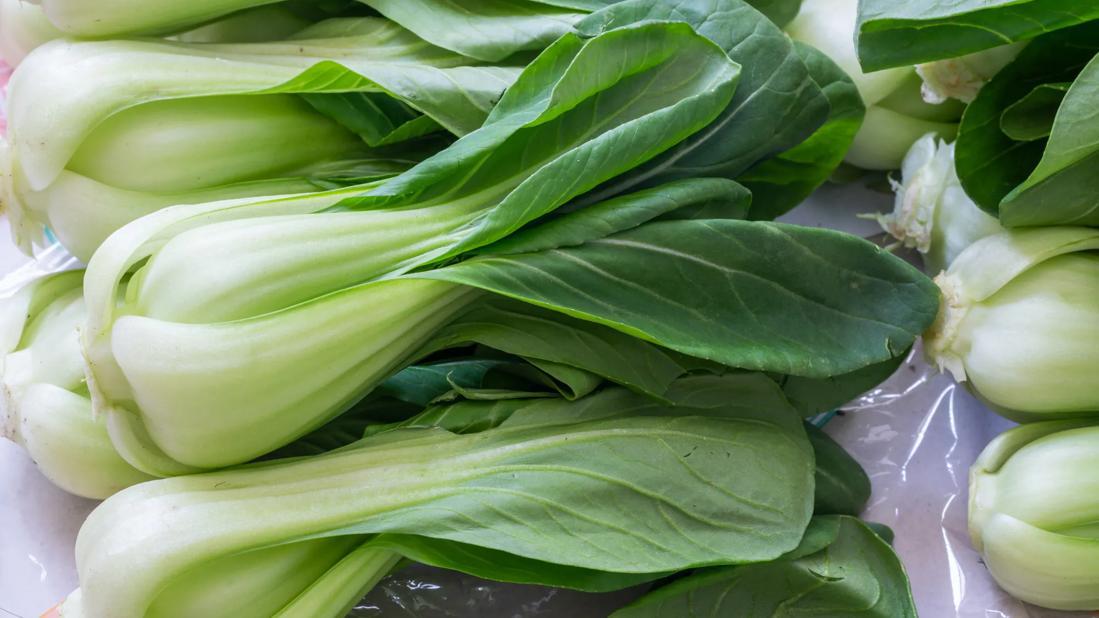5 Bok Choy Benefits
This cruciferous veggie boosts your bone, eye and heart health and contributes to a lower risk of cancer

Cruciferous vegetables, like broccoli, Brussels sprouts, cabbage and cauliflower, are exceptionally healthy. But not everyone loves them — and some people can’t easily digest them. If you’ve been skipping these foods in the produce section, bok choy may be your new best cruciferous friend.
“Bok choy is also known as Chinese cabbage, but it looks more like a bunch of leafy greens than a round head of cabbage,” says registered dietitian Julia Zumpano, RD, LD. “It’s much milder in flavor and easier to digest than its cruciferous cousins in the Brassica family.”
Zumpano explains why bok choy is good for you and how to eat more of it.
Nutrients in bok choy
Like all cruciferous veggies, bok choy (aka pak-choi) is packed with healthy goodness. It provides many important nutrients with few calories and no fat or cholesterol.
One cup of raw bok choy contains:
- 9 calories
- 1.5 grams of carbohydrates
- 1 gram of fiber
- 1.5 grams of protein
- 45.5 milligrams of sodium
- 1 gram of sugar
That same cup also provides several essential vitamins, including:
- 32 milligrams of vitamin C
- 32 micrograms of vitamin K
- 156 micrograms of vitamin A
- 46 micrograms of folate
“That means that a serving of bok choy provides more than one-third of your recommended daily value of vitamin C,” Zumpano points out.
5 health benefits of bok choy
If bok choy isn’t yet a standard item on your grocery list, it deserves a try — due, in part, to the fact that it contains a wealth of disease-fighting antioxidants and minerals.
Zumpano shares potential bok choy health benefits.
1. Helps protect cells from damage
Bok choy is loaded with the antioxidants your body needs to protect your cells from damage.
Here’s how it works: Your body naturally produces free radicals, unstable molecules that can run rampant and cause oxidative stress — a process that damages cells. This damage can eventually lead to chronic conditions like cancer, cardiovascular disease and more.
Antioxidants are nutrients that counteract free radicals, neutralizing them so they can’t cause damage. Bok choy provides cell-protecting antioxidants like:
2. Provides minerals for bone health
Your bones may seem rigid and unchanging, but they’re actually living tissue — and they need the vitamins and minerals found in veggies like bok choy to stay strong.
Maintaining healthy bones requires several minerals and other nutrients, which also help prevent osteopenia (bone density loss) and osteoporosis(brittle bones).
“Your body is constantly building up new bone tissue and breaking down old, damaged tissue, Zumpano explains. “So, you need a continuous supply of bone-building nutrients like calcium.”
Bok choy contains several nutrients that contribute to bone health:
- Calcium
- Phosphorus
- Vitamin C
- Vitamin K
- Zinc
“When you’re trying to get more calcium, you’re more likely to think about dairy foods than veggies,” Zumpano acknowledges. “But cruciferous and green leafy vegetables are actually great sources of calcium. And they’re in a form your body can easily absorb and use.”
3. Boosts eye health
Bok choy is an excellent source of beta-carotene and vitamin A, two important nutrients for protecting your eye health. Your body converts beta-carotene into vitamin A, so eating foods that contain both gives you a double boost!
These two powerful antioxidants help prevent:
- Cataracts
- Dry eyes
- Night blindness
- Vision loss due to age-related macular degeneration
4. Promotes heart health
Bok choy contains calcium and potassium, which both benefit your blood pressure. Plus, its antioxidants protect your entire cardiovascular system from free radical damage.
“The right balance of key minerals helps keep blood pressure in a healthy range,” Zumpano says. “Too much sodium can lead to high blood pressure, but calcium and potassium keep the damaging effects of sodium in check.”
Why does that matter? Because chronic high blood pressure (hypertension) stresses your heart and damages your arteries, which increases your risk of:
- Heart attack
- Heart disease
- Kidney disease
- Stroke
5. Contributes to a lower risk of cancer
“All cruciferous veggies, including bok choy, contain molecules that appear to help your body ward off cancer,” Zumpano says.
Research shows that including these vegetables in your diet once a week is associated with a lower risk of several types of cancer, including cancer of the mouth, esophagus, colorectum and breast.
Ways to cook and enjoy bok choy
“Bok choy’s green leaves and white stems are edible, and you can eat them either raw or cooked,” Zumpano shares. “If raw cruciferous vegetables tend to give you gas or other tummy troubles, you may want to stick with cooked bok choy.”
Not sure what to do with this super-veggie? Bok choy is tasty sautéed, steamed or grilled. You can chop it, slice it into strips or cook the leaves and stems whole. Try it on its own as a seasoned side or in a variety of dishes, like curries, vegetable medleys and even smoothies.
“Bok choy typically has a mild flavor,” Zumpano reiterates. “But if it’s too bitter for your tastes, try steaming it for a few minutes to mellow it out a bit.”